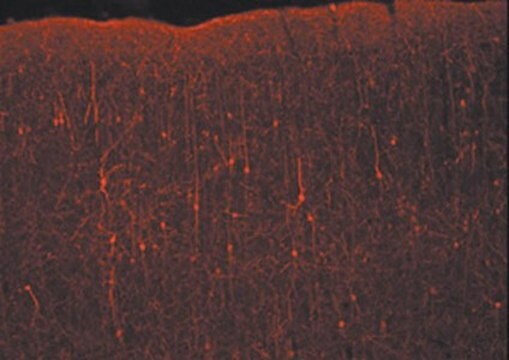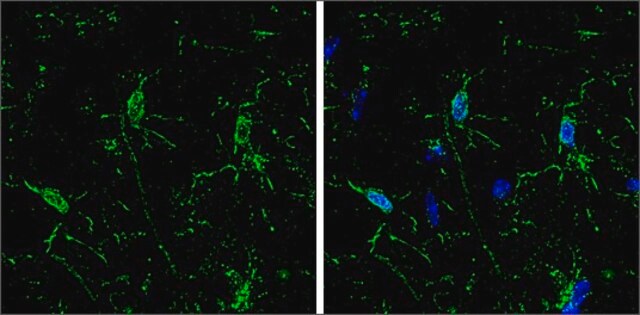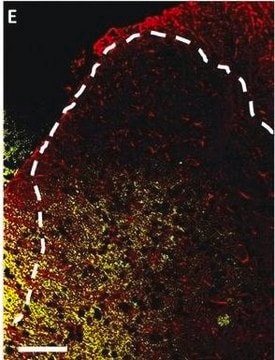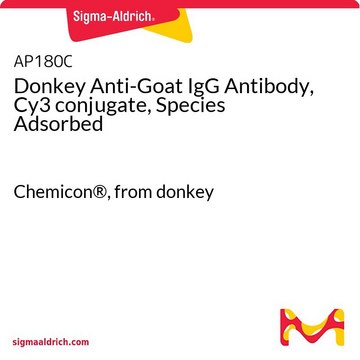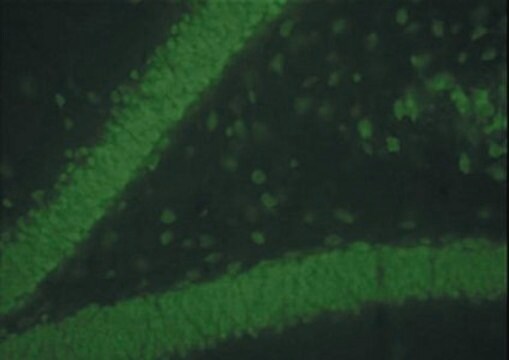AP192C
Donkey Anti-Mouse IgG Antibody, Cy3 conjugate, Species Adsorbed
Chemicon®, from donkey
Zaloguj sięWyświetlanie cen organizacyjnych i kontraktowych
About This Item
Kod UNSPSC:
12352203
eCl@ss:
32160702
NACRES:
NA.46
Polecane produkty
pochodzenie biologiczne
donkey
Poziom jakości
białko sprzężone
CY3 conjugate
forma przeciwciała
affinity purified immunoglobulin
rodzaj przeciwciała
secondary antibodies
klon
polyclonal
reaktywność gatunkowa
mouse
producent / nazwa handlowa
Chemicon®
metody
immunofluorescence: suitable
Warunki transportu
wet ice
docelowa modyfikacja potranslacyjna
unmodified
Powiązane kategorie
Opis ogólny
Immunoglobulin G (IgG), is one of the most abundant proteins in human serum with normal levels between 8-17 mg/mL in adult blood. IgG is important for our defence against microorganisms and the molecules are produced by B lymphocytes as a part of our adaptive immune response. The IgG molecule has two separate functions; to bind to the pathogen that elicited the response and to recruit other cells and molecules to destroy the antigen. The variability of the IgG pool is generated by somatic recombination and the number of specificities in an individual at a given time point is estimated to be 1011 variants.
Specyficzność
Specific for mouse IgG, heavy and light chain.
Zastosowanie
Research Category
Secondary & Control Antibodies
Secondary & Control Antibodies
Research Sub Category
Secondary Antibodies Adsorbed for Dual Labeling
Secondary Antibodies Adsorbed for Dual Labeling
This Donkey anti-Mouse IgG Antibody, Cy3 conjugate, Species Adsorbed is validated for use in IF for the detection of Donkey Mouse IgG.
Postać fizyczna
ImmunoAffinity Purified
Lyophilized. Buffer = 0.01M Sodium Phosphate, 0.25M NaCl, pH 7.6 with 15 mg/mL BSA, and 0.05% sodium azide.
Przechowywanie i stabilność
Store lyophilized material at 2–8°C for up to 1 year from date of shipment. After reconstitution this product is stable for several weeks at 2–8°C as an undiluted liquid. DO NOT FREEZE. Store away from light. For extended storage after reconstitution, add an equal volume of glycerol (ACS grade or better) to make a final concentration of 50% glycerol and store at 2–8°C for up to 6 months. Avoid repeated warming/cooling cycles. Please note that the concentration of protein and buffer salts will decrease to one-half of the original after adding glycerol.
Inne uwagi
Concentration: variable
Informacje prawne
CHEMICON is a registered trademark of Merck KGaA, Darmstadt, Germany
Oświadczenie o zrzeczeniu się odpowiedzialności
Unless otherwise stated in our catalog or other company documentation accompanying the product(s), our products are intended for research use only and are not to be used for any other purpose, which includes but is not limited to, unauthorized commercial uses, in vitro diagnostic uses, ex vivo or in vivo therapeutic uses or any type of consumption or application to humans or animals.
Ta strona może zawierać tekst przetłumaczony maszynowo.
Nie możesz znaleźć właściwego produktu?
Wypróbuj nasz Narzędzie selektora produktów.
Zwroty wskazujące rodzaj zagrożenia
Zwroty wskazujące środki ostrożności
Klasyfikacja zagrożeń
Aquatic Chronic 3
Kod klasy składowania
11 - Combustible Solids
Klasa zagrożenia wodnego (WGK)
WGK 3
Certyfikaty analizy (CoA)
Poszukaj Certyfikaty analizy (CoA), wpisując numer partii/serii produktów. Numery serii i partii można znaleźć na etykiecie produktu po słowach „seria” lub „partia”.
Masz już ten produkt?
Dokumenty związane z niedawno zakupionymi produktami zostały zamieszczone w Bibliotece dokumentów.
Tyrosine hydroxylase and aromatic L-amino acid decarboxylase do not coexist in neurons in the human anterior cingulate cortex.
K Ikemoto, K Kitahama, A Nishimura, A Jouvet, K Nishi, R Arai, M Jouvet, I Nagatsu
Neuroscience Letters null
Neuroprotective effect of the endogenous neural peptide apelin in cultured mouse cortical neurons.
Zeng, XJ; Yu, SP; Zhang, L; Wei, L
Experimental Cell Research null
Expression and localization of gap junctional connexins 26 and 43 in bovine periovulatory follicles and in corpus luteum during different functional stages of oestrous cycle and pregnancy.
Berisha B, Bridger P, Toth A, Kliem H, Meyer HH, Schams D, Pfarrer C
Reproduction in domestic animals = Zuchthygiene null
Low Mr phosphotyrosine protein phosphatase associates and dephosphorylates p125 focal adhesion kinase, interfering with cell motility and spreading.
Rigacci, S; Rovida, E; Dello Sbarba, P; Berti, A
The Journal of Biological Chemistry null
Liang-Qin Hou et al.
Development, growth & differentiation, 50(7), 531-541 (2008-05-29)
To define a genetic network that regulates development of the pancreas, we used high-density microarray (Affymetrix) to generate transcriptional profiles of rat pancreas from five biologically significant stages of development: embryonic day 12.5 (E12.5), E15.5, E18.5, postnatal day 0 (P0)
Nasz zespół naukowców ma doświadczenie we wszystkich obszarach badań, w tym w naukach przyrodniczych, materiałoznawstwie, syntezie chemicznej, chromatografii, analityce i wielu innych dziedzinach.
Skontaktuj się z zespołem ds. pomocy technicznej